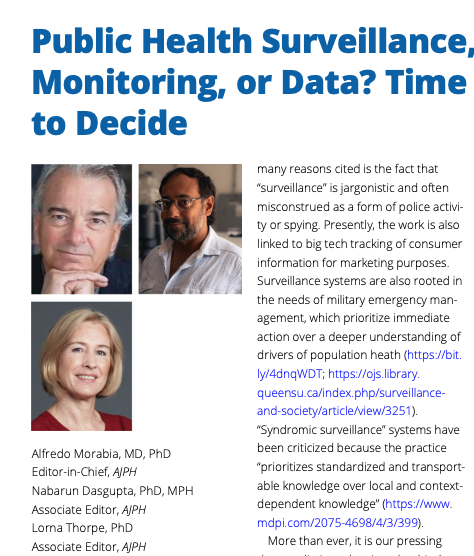Recently in the American Journal of Public Health, we've been pondering whether it's time to retire the word "surveillance" when it comes to public health monitoring. Some of this semantic argument has real impact on how we think about data from drug checking.
Three journal editors weighed in on the pros, cons, and alternatives in this editorial [open access].
In the October 2023 issue of the Journal, Kassler and Bowman eloquently outlined why the term “surveillance” has proven to be an unfortunate choice within the realm of public health. Among the many reasons cited is the fact that “surveillance” is jargonistic and often misconstrued as a form of police activity or spying. Presently, the work is also linked to big tech tracking of consumer information for marketing purposes. Surveillance systems are also rooted in the needs of military emergency management, which prioritize immediate action over a deeper understanding of drivers of population heath (cite). “Syndromic surveillance” systems have been criticized because the practice “prioritizes standardized and transportable knowledge over local and context-dependent knowledge.”
We feel strongly that drug checking data are could head this direction unless we keep the service focused on meeting the needs of people who use drugs.
For several months, AJPH has advocated adopting the term “public health monitoring” in lieu of “public health surveillance” (cite, cite). Public health monitoring encompasses the systematic collection of population data aimed at tracking the health status of populations. We have now officially updated our Instructions for Authors to encourage the systematic and consistent use of this terminology.
We note that the term “monitoring” is not entirely free of negative connotations either, even if these are not as readily apparent. In the context of global public health, “monitoring” may evoke systems of oversight established during colonialism: activities of grantees in low-resource settings are “monitored” by donors in wealthier countries who have little knowledge of local context. Monitoring also has the taint of law enforcement punishment, specifically the practice of location-tracking devices affixed like shackles onto the ankles of parolees. The commonality across these diverse settings is that information is extracted for the benefit of authority powers at the expense of local expertise.


